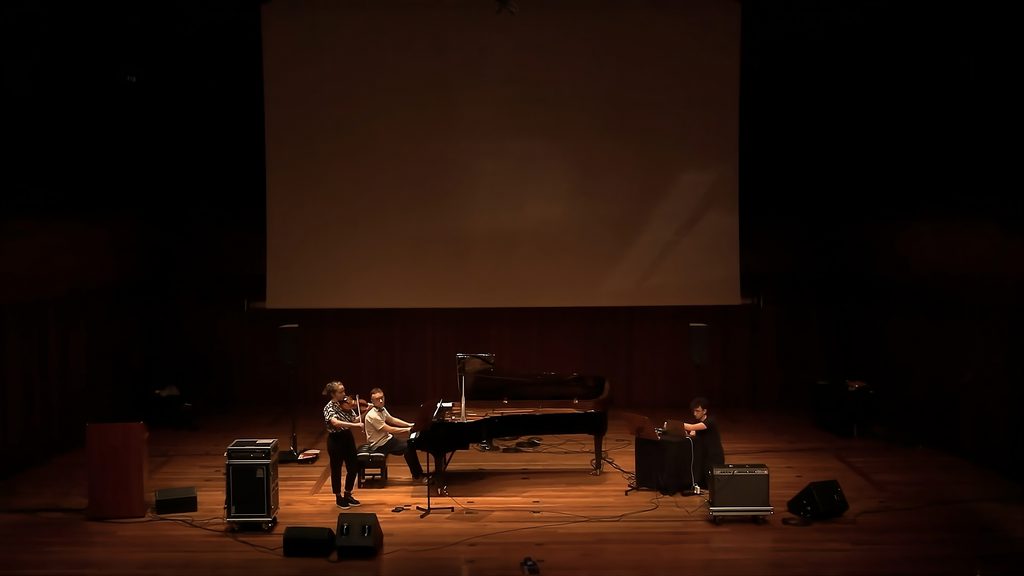The conference welcomed an international community of delegates and included a wide range of parallel sessions over four days, including research-framed performances, paper presentations, themed discussions, interactive workshops, installations and screenings. It offered an opportunity for both longstanding and emerging members of the research and practice community to network and engage collectively with the broad area of ‘performance studies’ in music.
While maintaining a spirit of openness to a variety of approaches and methodologies, this year’s conference included a thematic focus on concepts of Artistic Citizenship, Digital Performance and Production, and Socially Engaged Practice. Several Academy staff members presented and/or performed as part of the event. Among them were Roderick Chadwick, Adriana Festeu, Kathy Fry, David Gorton and Anthony Gritten.
David Gorton presented a paper co-authored with Stefan Östersjö (Piteå School of Music) on ‘Performing the Uncanny: stylistic dilemmas in “A Treatise of Melancholie”’. Created by Gorton in 2023, this large-scale, 60-minute work for tenor soloist, choir and small ensemble combines old and new materials in a deliberate attempt to realise an ‘aesthetic of the uncanny’. Drawing on recordings in which Östersjö played the lead accompaniment role, the presentation analysed and explored ‘the dilemmas that emerged in performing the uncanny, arguing that the piece not only brings contemporary and historical compositional techniques together, but in performance, it similarly activates historical and contemporary performance practices.’
Anthony Gritten’s paper ‘When is a Dry Run a Performance?’ reflected on the boundaries between practice and performance from a philosophical perspective. Incorporating examples from recent events by Benjamin Grosvenor, Hilary Hahn, in addition to historical examples from Leopold Godowsky, John Cage, and Claudio Arrau, Gritten sought to reveal insights into the nature of the relationship between performance and rehearsal, and the phenomenology of performance as ‘a distributed and situated phenomenon’.
Adriana Festeu, in her lecture-recital ‘Reciting Fragments: A reimagining of the vocal recital’, drew on knowledge of historical changes in concert programming through the late 19th and early 20th centuries as a basis from which to challenge some present-day conventions attached to the classical vocal recital. Accompanied by pianist Anca Preda, her recital consisted of art songs, concert and oratorio arias in multiple languages, with the art songs intentionally disconnected from their original cycles as ‘complete works’ and reconstructed as ‘fragmented’ materials within a programmed storyline, one that took account of voice-type as an expressive device.
Kathy Fry collaborated with Frances M Lynch (singer and artistic director of Electric Voice Theatre) on a lecture-recital exploring the music of British composer and freethinker Eliza Flower (1803–1846), whose archive of art songs, hymns and protest songs have remained largely unperformed since the 19th century. Their lecture-recital interspersed new recordings and live performances (accompanied by pianist Louise Cournarie) with historical discussion of Flower’s social and professional network in London amidst the rise of female authorship, and political and religious dissent.
Alongside papers and lecture-recitals, the conference incorporated several interactive and practical sessions, including a two-part workshop (at the start and end of the conference) led by Academy pianist Roderick Chadwick and violinist Mira Benjamin, who had issued an inclusive call for compositional work exploring any form of collaboration between composers and performers. Their aim was to create ‘a workshop space that is stylistically open, with no expectation or limits as to genre, style or sound world.’
The call for compositions was met by a wide range of submissions, including pieces by individual and co-composed pieces; work including fixed media and/or live electronics; pieces which disrupt or interrogate the hierarchy of creator, performer and/or audience; forms of notation or transmission that interrogate usual hierarchies; and work which showed awareness of the reality of the performers’ embodied practices. The featured composers were Moss Freed, Finn O’Hare, Julia Mahon, Amber Priestley and Megan Steinberg.
